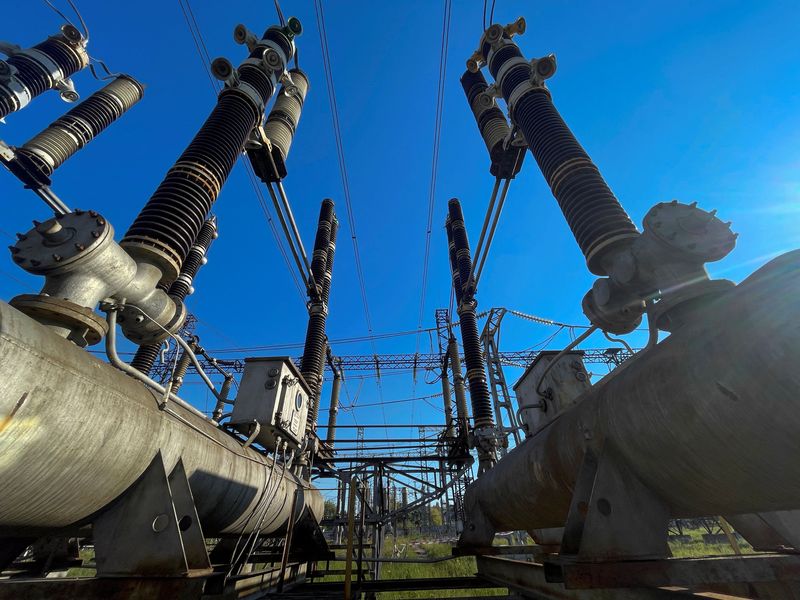By Olena Harmash
KYIV (Reuters) - Ukraine faces a second winter of lengthy power outages amid relentless Russian missile and drone attacks that have left parts of the energy system more vulnerable than a year ago.
Thousands of engineers have toiled over the summer months to repair broken equipment, and better air defences could help mitigate the impact of the war as temperatures begin to drop.
But there has been neither the money nor the time to complete preparations for the winter, meaning more long nights without light, heat and water for millions of Ukrainians and more suffering too for businesses and the wider economy.
"A lot (of effort) has gone to just repairing what has been destroyed. And have we been able to build an additional resilience? Are we in a better position than last winter? I don't think so," said Marcus Lippold, an energy team leader at the European Union's enlargement arm.
"It's been a big effort, it's been successful, but it needs to continue," he said in Brussels this week.
Ukraine accuses Russia of deliberately destroying energy installations to inflict maximum suffering on ordinary people, a charge Moscow denies. It says it does not target civilians, only military facilities.
The damage has been huge. Ukraine declines to share detailed data on the impact of attacks on its energy system, treating it as sensitive information during wartime.
But the United Nations estimated in June that Ukraine's power generation capacity had been reduced to roughly half the levels before Russia's full-scale invasion in February, 2022. Out of nearly 37 gigawatts (GW), more than 19 GW have been destroyed, damaged or occupied.
Kyiv School of Economics' research centre estimated the direct damage to Ukraine's energy infrastructure at $8.8 billion as of June.
During the last heating season, which runs from October to March and during which temperatures drop well below zero, the average Ukrainian living away from the frontline spent about 35 days without power. That also tends to affect water supply.
Last winter, Ukraine was helped by relatively mild weather, rapid repairs, nuclear power and electricity imports from Europe, but some officials expect tougher conditions this time.
Lviv mayor Andriy Sadovy said in August that his western city of about one million people, located far from the trenches in the east and south, should prepare for being without electricity for up to two months.
"Will there be difficulties? Yes. Will there be supply restrictions? I am sure there will be," said Oleksandr Kharchenko, director at the Energy Industry Research Center think-tank.
'EVERYONE IS PREPARING'
DTEK, Ukraine's largest private energy company which meets about a quarter of the country's needs, has seen its thermal power stations and other facilities repeatedly hit by Russian missiles, drones and artillery during nearly 20 months of war.
Dmytro Sakharuk, its executive director, told Reuters the company had carried out extensive repair works ahead of winter but that some power units required more time to restore because the damage was so significant.
"Certainly, we can say that the reliability level will be lower (than last year)," he said.
However, Sakharuk said DTEK had installed sandbags, concrete blocks, gabions and anti-drone grids to protect power units.
Ukraine's Prime Minister Denys Shmyhal said similar measures were being implemented nationwide.
Shmyhal also said seven nuclear power units were now ready for the winter, while repairs at two more were in the final stages. Nuclear power accounted for about 60% of Ukraine's electricity generation last year.
Volodymyr Kudrytskyi, head of national grid operator Ukrenergo, said the main grid, one of the most damaged parts of the energy system, was ready to transmit winter volumes of electricity.
"The energy system is not as reliable and with a smaller reserve capacity than it was before the targeted strikes," he said. "But at the same time, Russian terror will no longer be a surprise and everyone is preparing for it."
Ukraine has also stored enough gas to get through the winter without imports for the first time since independence in 1991, Oleksiy Chernyshov, CEO of Naftogaz, the country's biggest oil and gas company, told Reuters.
Among other measures to bolster Ukraine's energy resilience, the government has taken the first steps towards decentralising the sector, and agreed that Ukraine could import European electricity. Before the invasion it was a net exporter.
Some businesses and cities have started building their own capacity, turning to small-scale renewables where possible and installing generators.
Ukrainian companies and individuals have imported tens of thousands of generators, although sporadic attacks on oil depots threaten the supply of fuel to power the engines.

"Today, we have 83 powerful generators at our district heating providers and the water company," said Serhiy Sukhomlyn, mayor of Zhytomyr, a small city west of Kyiv.
"It is impossible to work off generators constantly. But if there is a complete power outage for several hours, we will be able to provide heating..."